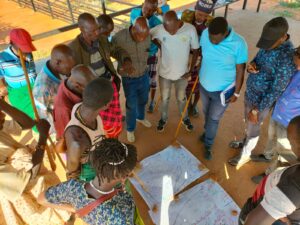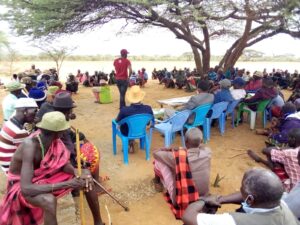
Elijah Lempaira works with IMPACT Kenya as a program manager in charge of land, environment, and climate justice programs in Northern Kenya. Elijah shares his learning journey and what inspires him, along with how being a member of the Grassroots Justice Network has impacted his work.

I’m from the Maasai community in Kenya from an area called Laikipia, I grew up in this landscape looking after cows. Over time I’ve been able to witness our land and in particular the grazing spaces shrink mainly due to land fragmentation/ subdivision and illegal acquisition. But I’ve also seen efforts from other people trying to secure the remaining community lands. For instance, I saw Mali Ole Kaunga who founded IMPACT and before that OSILIGI (Organization for the Survival of IL- Laikipia Maasai Indigenous Group Initiatives) and the fight they were engaged in back in the day pushing for the land that was illegally acquired to be reverted back to communities. Through that I really developed the interest to pursue this field and push for communities to understand their rights to land ownership.
The best way to really address any kind of a challenge is by doing it collectively. I think collective power has the strength to overcome any kind of challenge. We’ve seen that, in the process of registration of community lands in Kenya, through collective action communities have been able to push for their rights, and some of them have succeeded in terms of getting ownership of their community lands.
“There is power when people come together.”

Community members conducting resource mapping and land planning.
I’m based in Kenya and we have other network members who come from other parts of the world, and when you listen to stories, you see, it really resonates with what you are also fighting for. I see that it doesn’t matter where you come from; we more or less, have the same challenges, and there’s a need for us to address this as a team. And, to me, the network plays this role.
It brings all of us together, it unites us, and through this we are able to see the challenges we are addressing, and I think through this am able to see that the challenges am dealing with in Kenya are not unique and importantly am not alone in this, that there’s somebody else in another part of the world dealing with the same issue. And so, there’s something I can learn from that, and that maybe if we come together, we can easily be able to address some of these things.
I see the network as a platform or an avenue that brings people together, and by doing that we’re able to push for some of these things together.
The network has been very helpful to me, as a member, on a personal level and also as an organization level. We’ve been able to benefit in several ways. Last year, I went to Indonesia for the carbon workshop, and through that, currently in Kenya, carbon rights is a huge, huge topic, and I think globally.
Kenya is putting legal structures in place to be able to regulate and manage carbon markets. Carbon trading is happening in our communities, and these communities have no understanding of what carbon is. They already have existing carbon projects with some accruing benefits; they are getting some money, but they don’t know the process, and they were never involved in terms of the formulation of the project itself in their community lands.

Elijah (standing) at a community wide meeting where members review and adopt the community bylaws and the register of members.
The network coming with such interventions or opportunities for us to learn about current trends helps in terms of how we also engage the communities and help them in the process. Now we are working with these communities to collectively bargain, so that they’re able to get the documentation for carbon projects that’s happening in their land, and also ensure that there is absolute community involvement in the process and decision-making.
“The network is creating space for us to learn about the emerging issues that are helping us, and of course it also goes back to the communities.”
They also need to be given a space to challenge the benefit sharing modalities. How the formula was arrived at. This is their land, and they need to have the power to make decisions based on what’s happening. But it’s not the case, however they are now pushing to do that. And we are working together with them to collectively bargaining for this.
What inspires me is that you cannot really achieve anything if you don’t try. I know it’s difficult, but if you persist and you keep going, you’ll eventually be able to get what you want. That’s what I do. I try to fully engage. And mainly through collective power, I see that as an effective strategy to achieve your desired outcomes.